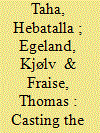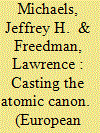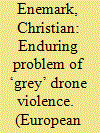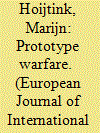|
|
|
Sort Order |
|
|
|
Items / Page
|
|
|
|
|
|
|
| Srl | Item |
| 1 |
ID:
185831


|
|
|
|
|
| Summary/Abstract |
Looming decisions on arms control and strategic weapon procurements in a range of nuclear-armed states are set to shape the international security environment for decades to come. In this context, it is crucial to understand the concepts, theories, and debates that condition nuclear policymaking. This review essay dissects the four editions of The Evolution of Nuclear Strategy, the authoritative intellectual history of its subject. Using this widely acclaimed work as a looking glass into the broader field of nuclear security studies, we interrogate the field's underlying assumptions and question the correspondence between theory and practice in the realm of nuclear policy. The study of nuclear strategy, we maintain, remains largely committed to an interpretive approach that invites analysts to search for universal axioms and to abstract strategic arguments from the precise circumstances of their occurrence. While this approach is useful for analysing the locutionary dimension of strategic debates, it risks obscuring the power structures, vested interests, and illocutionary forces shaping nuclear discourse. In the conclusion, we lay out avenues for future scholarship.
|
|
|
|
|
|
|
|
|
|
|
|
|
|
|
|
| 2 |
ID:
185832


|
|
|
|
|
| Summary/Abstract |
We are grateful to Kjølv Egeland, Thomas Fraise, and Hebatalla Taha for their commentary on the four editions of The Evolution of Nuclear Strategy. In addition to their critique of the book, their review was intended to offer ‘a looking glass into the broader field of nuclear security studies’. Our reply to their review therefore touches both upon their critique, as well as the more general theme of writing about the history of nuclear strategy. Although we disagree with many of their criticisms, and in some instances believe our work was misrepresented, the reviewers have nevertheless made points that deserve serious consideration by ourselves as well as other scholars working in the field. In this reply, we not only defend our work, but also use this as an opportunity to discuss how to approach the past of nuclear strategy, which in turn can allow us to better appreciate the present and future. In the first half of our reply we discuss the reviewers’ more general criticisms of our approach. In the second half we deal with some specific criticisms.
|
|
|
|
|
|
|
|
|
|
|
|
|
|
|
|
| 3 |
ID:
185825


|
|
|
|
|
| Summary/Abstract |
Afghanistan is one of the most drone-affected states, however, very few scholarly studies of drone use there exist. This article uses original fieldwork data in a strategically important area of Afghanistan, eastern Nangarhar province, to analyse drone effects in context. It raises important concerns about the ability of the US to attain stated counterterrorism and counterinsurgency goals. Our results show contextualised analysis of drone use necessitates appropriate enquiry into policy, doctrine, and local circumstances. It also reveals serious incoherence, inaccurate assumptions, and insufficient appreciation of local circumstances and dynamics not only in US policy and doctrine, but also numerous scholarly studies of drone use effectiveness. This has far-reaching policy, operational, and research implications, including regarding local communities’ governance, relations, and resilience to insurgent and terrorist encroachment. Therefore, we contribute to debates about how to analyse and assess drone use and its effects, why drone analysis needs to change, and what more effective forms of research and analysis can reveal.
|
|
|
|
|
|
|
|
|
|
|
|
|
|
|
|
| 4 |
ID:
185826


|
|
|
|
|
| Summary/Abstract |
This article addresses the problem of drone violence that is ‘grey’ in the sense of being hard to categorise. It focuses on circumstances, such as arose in Pakistan, in which a foreign government's armed drones are a constant presence. A lesson from US experience there is that the persistent threat of drone strikes is intended to suppress activities that endanger the drone-using state's security. However, this threat inevitably affects innocent people living within potential strike zones. To judge such drone use by reference to military ethics principles is to assume that ‘war’ is going on, but indefinite drone deployments are difficult to conceptualise as war, so traditional Just War thinking does not suffice as a basis for moral judgement. In assessing the US government's commitment to drone-based containment of risks emerging along its ‘terror frontier’, the article considers three alternative conceptualisations of drone violence arising in non-war contexts: vim (‘force short of war’), terrorism, and imperialism. It then rejects all three and proposes that such violence is better conceptualised as being merely ‘quasi-imperialistic’. On this basis, however, the sustaining of a drone strike campaign against a series of suspected terrorists can still be condemned as violating the right to life.
|
|
|
|
|
|
|
|
|
|
|
|
|
|
|
|
| 5 |
ID:
185828


|
|
|
|
|
| Summary/Abstract |
Will AI-enabled capabilities increase inadvertent escalation risk? This article revisits Cold War-era thinking about inadvertent escalation to consider how Artificial Intelligence (AI) technology (especially AI augmentation of advanced conventional weapons) through various mechanisms and pathways could affect inadvertent escalation risk between nuclear-armed adversaries during a conventional crisis or conflict. How might AI be incorporated into nuclear and conventional operations in ways that affect escalation risk? It unpacks the psychological and cognitive features of escalation theorising (the security dilemma, the ‘fog of war’, and military doctrine and strategy) to examine whether and how the characteristics of AI technology, against the backdrop of a broader political-societal dynamic of the digital information ecosystem, might increase inadvertent escalation risk. Are existing notions of inadvertent escalation still relevant in the digital age? The article speaks to the broader scholarship in International Relations – notably ‘bargaining theories of war’ – that argues that the impact of technology on the cause of war occurs through its political effects, rather than tactical or operational battlefield alterations. In this way, it addresses a gap in the literature about the strategic and theoretical implications of the AI-nuclear dilemma.
|
|
|
|
|
|
|
|
|
|
|
|
|
|
|
|
| 6 |
ID:
185827


|
|
|
|
|
| Summary/Abstract |
In recent years, the concept of ‘prototype warfare’ has been adopted by Western militaries to accelerate the experimental development, acquisition, and deployment of emerging technologies in warfare. Building on scholarship at the intersection of Science and Technology Studies and International Relations investigating the broader discursive and material infrastructures that underpin contemporary logics of war, and taking a specific interest in the relationship between science, technology, and war, this article points out how prototype warfare captures the emergence of a new regime of warfare, which I term the experimental way of warfare. While warfare has always been defined by experimental activity, what is particular in the current context is how experimentation spans across an increasingly wide range of military practices, operating on the basis of a highly speculative understanding of experimentation that embraces failure as a productive force. Tracing the concept of prototype warfare across Western military discourse and practice, and zooming in on how prototype warfare takes experimentation directly into the battlefield, the article concludes by outlining how prototype warfare reconfigures and normalises military intervention as an opportunity for experimentation, while outsourcing the failures that are a structural condition of the experimental way of warfare to others, ‘over there’.
|
|
|
|
|
|
|
|
|
|
|
|
|
|
|
|
| 7 |
ID:
185830


|
|
|
|
|
| Summary/Abstract |
Only two European countries – France and the UK, both NATO members – have nuclear weapons, and leading politicians have called for the UK and EU to maintain close military and security links post-Brexit. In the context of the Trident renewal debate and the UK government's recently published integrated defence and security review, this article uses data from the new UK Security Survey to analyse attitudes towards the possession of nuclear weapons among the British public. It assesses three key theorical strands in the wider scholarly literature on public opinion and states’ use of military force: domestic political attitudes, foreign policy predispositions, and the ‘gender gap’. We find that all three theoretical perspectives contribute to the underpinnings of contemporary public opinion towards nuclear weapons. Support for the retention of Britain's nuclear deterrent is associated with being a Conservative Party supporter, favouring Brexit, endorsing superior military power worldwide as an important foreign policy goal, wanting to protect the transatlantic relationship, and with being male. The article makes a distinctive contribution to the growing subfield of research on public opinion and foreign policy, while the findings advance wider empirical understanding of contemporary citizen engagement in a key dimension of security policy.
|
|
|
|
|
|
|
|
|
|
|
|
|
|
|
|
|
|
|
|
|